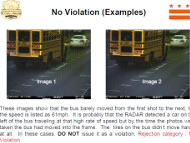Article from: www.thenewspaper.com/news/45/4509.asp
9/9/2014
DC Inspector General Blasts City Over Bogus Camera Tickets
Inspector general for Washington, DC says photo and parking ticket program is designed for maximizing citations, not accuracy.
 Speed cameras, red light cameras and parking tickets generate big cash for the District of Columbia. The city's inspector general on Monday issued a report questioning the diligence of city officials and private vendors in ensuring that the 2,398,136 tickets issued in 2013 -- nearly four tickets per resident, worth $171,680,640 -- were valid.
Speed cameras, red light cameras and parking tickets generate big cash for the District of Columbia. The city's inspector general on Monday issued a report questioning the diligence of city officials and private vendors in ensuring that the 2,398,136 tickets issued in 2013 -- nearly four tickets per resident, worth $171,680,640 -- were valid.
At most of the speed camera locations in the city, the cameras owned and operated by American Traffic Solutions (ATS), an Arizona company, use radar to guess a vehicle's speed without being able to tell which vehicle within the radar's field of view produced the reading.
"The OIG [office of the inspector general] learned that in those instances when multiple vehicles appear in the violation image(s), MPD [Metropolitan Police Department] reviewers decide, with what the OIG believes is a lack of precision and certainty, which vehicle was speeding and whether there is sufficient distance between the violating vehicle and others in the images to justify issuance of a ticket," the report found.
The police training manual for the camera system includes a speed camera photo of a bus that is nearly stationary. The photo radar unit "clocked" the bus at 61 MPH, but reviewers are instructed to throw out such tickets.
"In many situations, one or two speed camera images cannot tell an accurate story, and when such situations are left to a reviewer's interpretation and judgment, arbitrary and erroneous ticketing decisions will result," the report found. "Once the ticket is issued, however, the onus is on the recipient to disprove an erroneous interpretation of events, or simply pay the fine."
The odds of mistakes are high, since DC's ticket reviewers processed on average between 100 and 500 tickets per hour. That means in some cases the "review" is a glance lasting 7 seconds.
"MPD's ATE training manual also instructs reviewers to accept violations and issue tickets in certain instances where the type of vehicle captured in the ATE images does not comport with information obtained through MPD's search of vehicle registration databases," the report found. "The OIG believes that MPD should discontinue this practice because it leads to the issuance of erroneous tickets, which then puts a recipient of such a ticket in the challenging and frustrating position of trying to prove to a hearing examiner -- without having vehicle registration information that MPD has access to or an understanding of how his or her vehicle was identified -- that he or she is not the owner of the subject vehicle."
City officials have also failed to make clear to meter maids whether it is legal for a driver to park at a broken meter.
"Skeptical members of the public might believe that the District's failure to inform them on this subject is intentional: without clear criteria of the District's ticketing policy, a ticketed motorist is unable to prove that DDOT enforcement officers failed to follow proper procedure," the report found.
One of the top officials in the city explained to the inspector general that the skeptical view is the correct view.
"One of the beauties of parking, it's like the [Internal Revenue Service]," the official said. "If you get a parking ticket, you are guilty until you have proven yourself innocent... That has worked well for us."
A copy of the report is available in a 1.3mb PDF file at the source link below.
Source: Parking and Automated Traffic Enforcement Ticket Issuance Practices (Washington, DC Inspector General, 9/8/2014)
Permanent Link for this item
Return to Front Page
 Speed cameras, red light cameras and parking tickets generate big cash for the District of Columbia. The city's inspector general on Monday issued a report questioning the diligence of city officials and private vendors in ensuring that the 2,398,136 tickets issued in 2013 -- nearly four tickets per resident, worth $171,680,640 -- were valid.
Speed cameras, red light cameras and parking tickets generate big cash for the District of Columbia. The city's inspector general on Monday issued a report questioning the diligence of city officials and private vendors in ensuring that the 2,398,136 tickets issued in 2013 -- nearly four tickets per resident, worth $171,680,640 -- were valid.